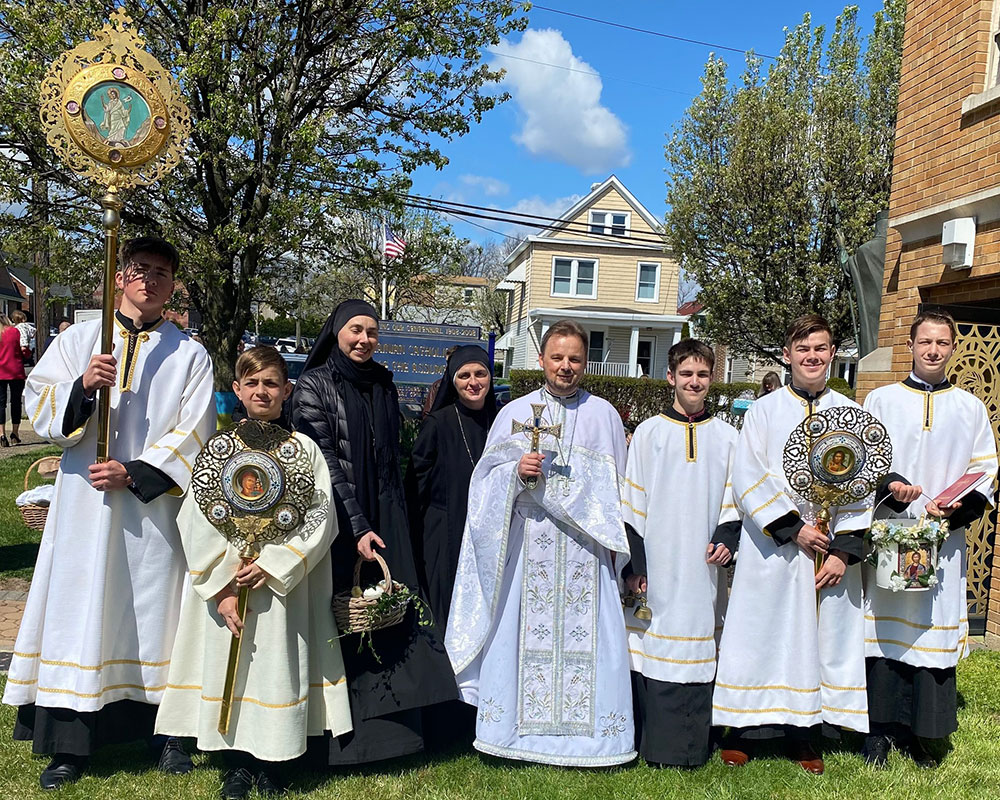Facebook
Youtube
Instagram
“The Eucharist must be one of our great loves, since it is the undeniable sign of God’s immeasurable love for men, it is the sign of a God who wants to remain among men and who gives Himself up to man totally: In the Sacrament, the logic of the Incarnation reaches its extreme consequences”
Dir. Spirituality, 300
Our Directory of Popular Missions states that “God willed the world to be saved by means of missionaries.”[1] And Scriptures says, It was the will of God through the foolishness of the proclamation to save those who have faith.[2] And so, all of the history of the Church gives witness to how God, in his infinite mercy, associated countless men and women to work in his vineyard, for, “by the missions alone souls obtain eternal life.”[3] And as “the works of God are always under attack so that the Divine Magnificence may shine forth,”[4] St. Alphonsus would say: “we can clearly perceive the efforts of hell to prevent [the preaching of missions].”[5]
The command of Christ to the Apostles is not something that belongs in the past, but it enjoys a perennial actuality within his Holy Church. St. John Paul II, in the encyclical Redemptoris Missio affirms: “What was done at the beginning of Christianity to further its universal mission remains valid and urgent today. The Church is missionary by her very nature, for Christ’s mandate is not something contingent or external, but reaches the very heart of the Church. It follows that the universal Church and each individual church is sent forth to the nations.”[6] Pope Francis says the same thing repeatedly, when he speaks of the permanent missionary dynamism of the Church which always leads her to “go forth.”[7]

If the Church were not missionary, it would betray its very essence and mission, which is to prolong the redeeming sending of the Incarnate Word of God. Such is the teaching of the entire Church tradition, which was expressed most eloquently in the Second Vatican Council: “The pilgrim Church is missionary by her very nature, since it is from the mission of the Son and the mission of the Holy Spirit that she draws her origin, in accordance with the decree of God the Father.”[8] And in another place: “As the Son was sent by the Father, so He too sent the Apostles (Jn 20: 21), saying: Go, therefore, make disciples of all nations, baptizing them in the name of the Father and of the Son and of the Holy Spirit, teaching them to observe all things whatsoever I have commanded you. And behold I am with you all days even to the consummation of the world (Mt 28: 19-20). The Church has received this solemn mandate of Christ to proclaim the saving truth from the Apostles and must carry it out to the very ends of the earth (cf. Acts 1: 8). Wherefore she makes the words of the Apostle her own: Woe to me, if I do not preach the Gospel (1 Cor 9: 16) and continues unceasingly to send heralds of the Gospel until such time as the infant churches are fully established and can themselves continue the work of evangelizing.”[9]

In the same way, our Institute—born in the heart of the Church through a charismatic grace of the Holy Spirit, which serves for the edification of that same Church—has been conceived as a missionary Institute and each of us is sent by Christ in the same way that Christ was sent by the Father. For this reason, we say: “Imitating ‘Christ proclaiming the Kingdom of God,’[10] we want to dedicate ourselves to apostolic work.”[11] This call to mission is so deeply rooted in our vocation as religious of the Incarnate Word that we say that we long to be “‘like a new Incarnation of the Word,’ thus fulfilling our essential call to be missionaries and Marian.”[12]
Hence, “our small Religious Family must never be closed around itself, but rather must be open like the arms of Christ on the Cross that were ‘dislocated’ for love’s sake.”[13] We must always firmly maintain this rooted in our mind and in our heart. Individually and collectively speaking, we should feel the burning responsibility of the commitment acquired the day of our religious profession of vows within our Institute: the commitment to “not to be elusive to the missionary adventure.”[14]
For this reason, “the missionaries of our Institute, ‘for such an exalted task, are to be prepared by a special spiritual and moral training. For they must have the spirit of initiative in beginning, as well as that of constancy in carrying through what they have begun; they must be persevering in difficulties, patient and strong of heart in bearing with solitude, fatigue, and fruitless labor.’”[15]

[1] Directory of Popular Missions, 45.
[2] 1 Cor 1: 21.
[3] Directory of Popular Missions, 45; Saint Alphonsus María Liguori, Complete Ascetical Works of St. Alphonsus, Reflections useful for bishops, Madrid 1954, 38; cf. Idem, Letter to a new Bishop, Madrid 1954, 380.
[4] Directory of Spirituality, 37; Saint paul of the cross, Letter 47, (Bilbao: Declée, 1960).
[5] Directory of Popular Missions, 45; op. cit. Saint Alphonsus María Liguori, Complete Ascetical Works of St. Alphonsus, Letter to a new Bishop, Madrid 1954, 380.
[6] Saint John Paul II, Encyclical Letter Redemptoris Missio, 62.
[7] For example, in the Apostolic Exhortation Evangelii Gaudium, nn. 20-23.
[8] Vatican Council II, Decree on the Missionary Activity of the Church Ad Gentes, 2.
[9] Vatican Council II, Dogmatic Constitution on the Church Lumen Gentium, 17.
[10] CIC, c. 577.
[11] Constitutions, 22.
[12] Constitutions, 31; Saint Elizabeth of the Trinity, Elevation 33.
[13] Directory of Spirituality, 263.
[14] Cf. Constitutions, 254. 257.
[15] Directory of Missions Ad Gentes, 107.
Share your prayer request with religious and friends of the IVE here. You can see other prayer requests by subscribing to Resound http://iveamerica.org/#prayerrequest